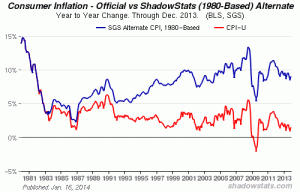Three Types of Lie: Lies, Damn Lies & Statistics
This expression was apparently first used by Mark Twain, who attributed it to Benjamin Disraeli, the 19th century British Prime Minister. To quote Mark Twain: “Facts are stubborn things, but statistics are pliable.”
These are appropriate quotes today, where suspicion abounds about the “accuracy” of government statistics. While Chinese statistics are often considered the most pliable, it appears that no country is immune to a little tweaking of the data for political purposes.
To take one example that always seems to be controversial; the US Consumer Price Index. The current official CPI is around 1.5%, yet some commentators consider that it is much higher. This is because the data that are used to calculate the CPI are “heuristically adjusted”. To many, a heuristic adjustment is little more than an educated guess, biased to favour desired political outcomes.
For example, the CPI adjusts the price component of a television downwards to reflect the fact that the modern television is so much better than one from 20 years ago.
John Williams of Shadow Government Statistics thinks otherwise. The chart below shows his take on the CPI (inflation). His site is worth a visit but be aware that he is very controversial.
Courtesy http://www.shadowstats.com/
Last Word
In The General Theory of Employment, Interest and Money, John Maynard Keynes said:
“The fact that two incommensurable collections of miscellaneous objects cannot in themselves provide the material for a quantitative analysis need not, of course, prevent us from making approximate statistical comparisons, depending upon some broad element of judgement rather than of strict calculation, which may possess significance and validity within certain limits.”
Sounds suspiciously as though government statistics are a little like guesswork…

